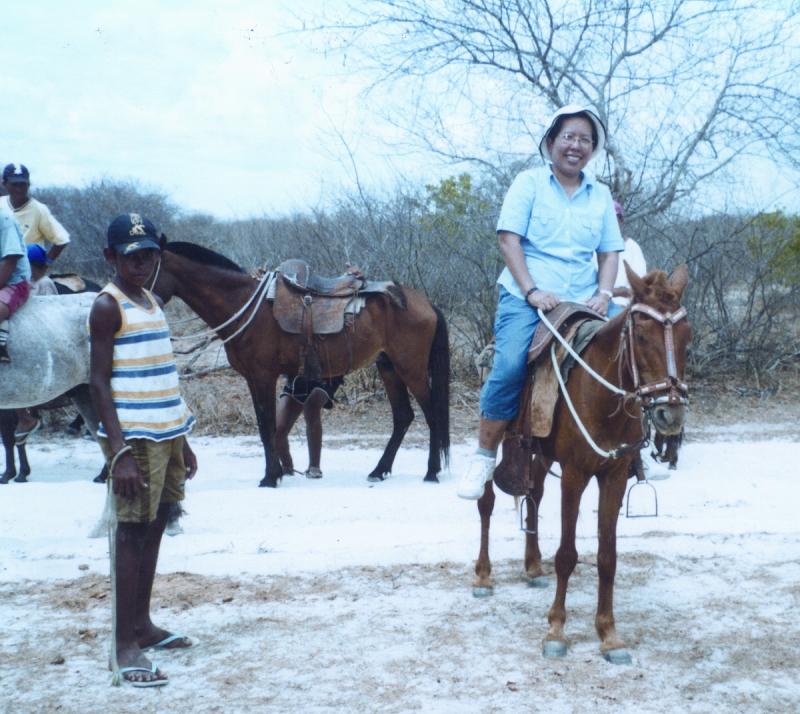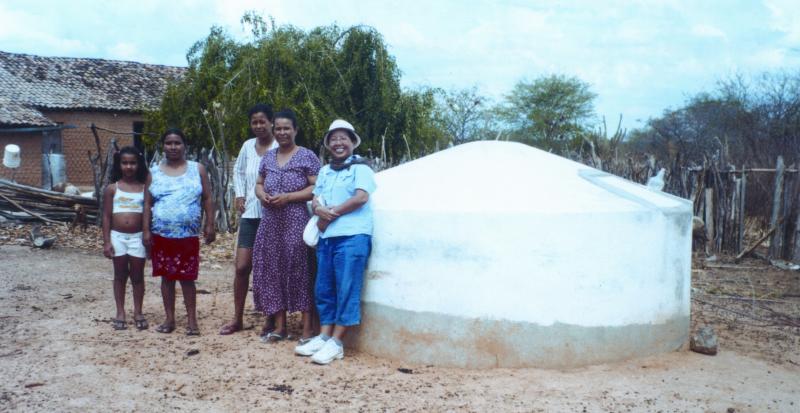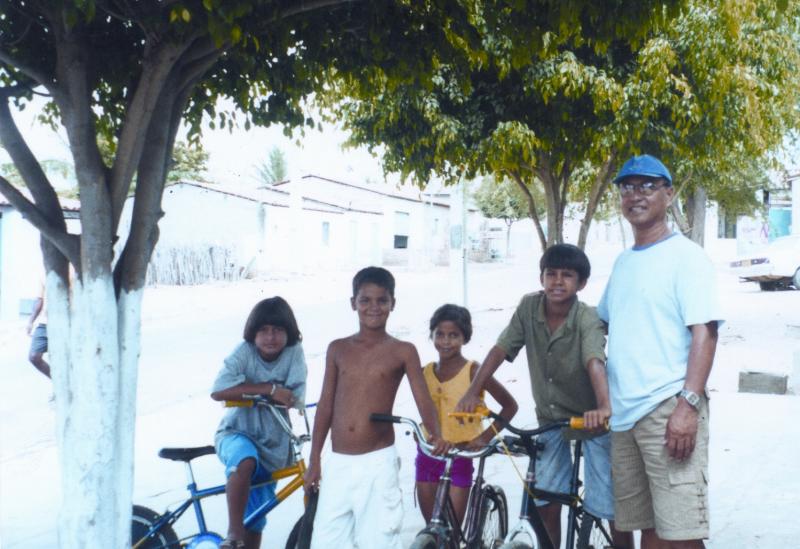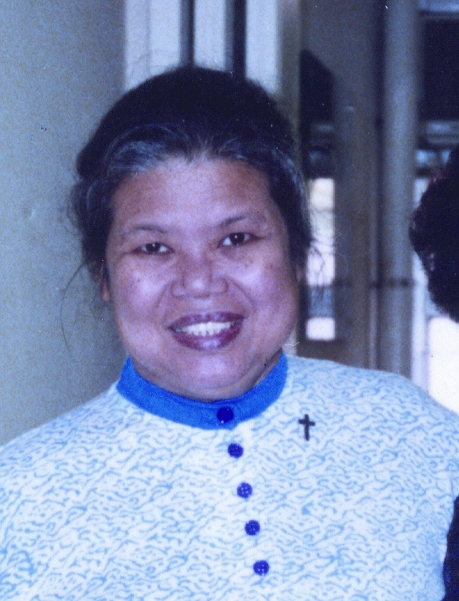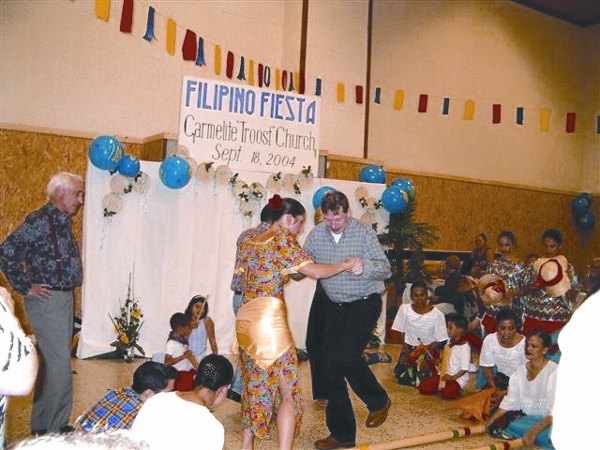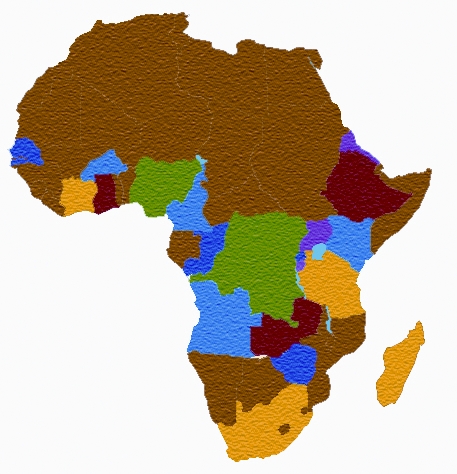September-October 2005
A Filipina In Poland Mourns John Paul
By Florie Andrion Oginska
Florie A. Oginska, originally from Manila, lives with her husband Jaromir in Poland.
I was in the garden talking to my brother-in-law when my mother-in-law rushed out with tears in her eyes announcing that the Pope was very ill. That day started to cloud the spring atmosphere as far as the Poles were concerned.
Pope John Paul’s final trip, not to his Polish but to his heavenly homeland, had a sorrowful impact on Poles. The response of the people from the onset of his final illness to his last moments bore witness to that. Regular TV shows were cancelled for minute-to-minute broadcasts of what was going on in the Vatican. Special Masses were offered for the Pope and surprisingly, were really well attended. People lit candles outside churches or in designated spots in parks. It seemed that all the people I knew, even lukewarm Catholics and non-churchgoers, were touched by his departure.
It was indeed touching to see people gather to pay tribute to Pope John Paul. As I sat for almost twelve hours in front of the TV flitting from one channel to another, in most cases not really understanding what was being said for I still lack fluency in Polish, people were shown attentively watching giant screens set up in public places. Very sad people, some crying as if they’d lost somebody personally close to them. For that is how most Poles feel about Pope John Paul II.
Pope John Paul was not just pope. He was truly considered Father not only of Catholics but of the nation itself. He was the catalyst that freed the country from the Communist regime, thus making him more than a Pope to the people here.
One cannot help but feel real sorrow when one is submerged in it.
Address Of John Paul II
TO THE ABORIGINES AND TORRES STRAIT ISLANDERS
Alice Springs, 29 November 1986
9 October is Indigenous Peoples’ Sunday in the Philippine Church. 23 October is World Mission Sunday. The late Pope John Paul’s talk to the Aboriginal Peoples of Australia calls us to respect all cultures and languages, including our own. He reminds missionaries that the Gospel speaks all languages, esteems and embraces all cultures. He challenges our lack of respect for God’s creation and how we can learn from those who have lived in harmony with it for millennia, including the Indigenous Peoples of the Philippines.
Dear Brothers and Sisters,
It is a great joy for me to be here today in Alice Springs and to meet so many of you, the Aborigines and Torres Strait Islanders of Australia. I want to tell you right away how much the Church esteems and loves you, and how much she wishes to assist you in your spiritual and material needs.
1. At the beginning of time, as God’s Spirit moved over the waters, he began to communicate something of his goodness and beauty to all creation. When God then created man and woman, he gave them the good things of the earth for their use and benefit; and he put into their hearts abilities and powers, which were his gifts. And to all human beings throughout the ages God has given a desire for himself, a desire which different cultures have tried to express in their own ways.
2. As the human family spread over the face of the earth, your people settled and lived in this big country that stood apart from all the others. Other people did not even know this land was here; they only knew that somewhere in the southern oceans of the world there was ‘The Great South Land of the Holy Spirit.’ But for thousands of years you have lived in this land and fashioned a culture that endures to this day. And during all this time, the Spirit of God has been with you. Your ‘Dreaming,’ which influences your lives so strongly that, no matter what happens, you remain forever people of your culture, is your only way of touching the mystery of God’s Spirit in you and in creation. You must keep your striving for God and hold on to it in your lives.
3. The rock paintings and the discovered evidence of your ancient tools and implements indicate the presence of your age-old culture and prove your ancient occupancy of this land. Your culture, which shows the lasting genius and dignity of your race, must not be allowed to disappear. Do not think that your gifts are worth so little that you should no longer bother to maintain them. Share them with each other and teach them to your children. Your songs, your stories, your paintings, your dances, your languages, must never be lost. Do you perhaps remember those words that Paul VI spoke to the Aboriginal people during his visit to them in 1970? On that occasion he said:
‘We know that you have a lifestyle proper to your own ethnic genius or culture – a culture which the Church respects and which she does not in any way ask you to renounce ... Society itself is enriched by the presence of different cultural and ethnic elements. For us, you and the values you represent are precious. We deeply respect your dignity and reiterate our deep affection for you.’
4. For thousands of years this culture of yours was free to grow without interference by people from other places. You lived your lives in spiritual closeness to the land, with its animals, birds, fishes, waterholes, rivers, hills and mountains. Through your closeness to the land you touched the sacredness of man’s relationship with God, for the land was the proof of a power in life greater than yourselves. You did not spoil the land, use it up, exhaust it and then walk away from it. You realized that your land was related to the source of life. The silence of the Bush taught you a quietness of soul that put you in touch with another world, the world of God’s Spirit. Your careful attention to the details of kinship spoke of your reverence for birth, life and human generation. You knew that children need to be loved, to be full of joy. They need a time to grow in laughter and to play, secure in the knowledge that they belong to their people. You had a great respect for the need which people have for law, as a guide to living fairly with each other. So you created a legal system – very strict it is true – but closely adapted to the country in which you lived your lives. It made your society orderly. It was one of the reasons why you survived in this land. You marked the growth of your young men and women with ceremonies of discipline that taught them responsibility as they came to maturity. These achievements are indications of human strivings. And in these strivings you showed a dignity open to the message of God’s revealed wisdom to all men and women, which is the great truth of the Gospel of Jesus Christ.
5. Some of the stories from your Dreamtime legends speak powerfully of the great mysteries of human life, its frailty, its need for help, its closeness to spiritual powers and the value of the human person. They are not unlike some of the great inspired lessons from the people among whom Jesus himself was born. It is wonderful to see how people, as they accept the Gospel of Jesus, find points of agreement between their own traditions and those of Jesus and his people.
6. The culture which this long and careful growth produced was not prepared for the sudden meeting with another people, with different customs and traditions, who came to your country nearly 200 years ago. They were different from Aboriginal people. Their traditions, the organization of their lives, and their attitudes to the land were quite strange to you. Their law too was quite different. These people had knowledge, money and power; and they brought with them some patterns of behavior from which the Aboriginal people were unable to protect themselves.
7. The effects of some of those forces are still active among you today. Many of you have been dispossessed of your traditional lands, and separated from your tribal ways, though some of you still have your traditional culture. Some of you are establishing Aboriginal communities in the towns and cities. For others there is still no real place for camp-fires and kinship observances except on the fringes of country towns. There, work is hard to find, and education in a different cultural background is difficult. The discrimination caused by racism is a daily experience. You have learned how to survive, whether on your own lands, or scattered among the towns and cities. Though your difficulties are not yet over, you must learn to draw on the endurance which your ancient ceremonies have taught you. Endurance brings with it patience; patience helps you to find the way ahead, and gives you courage for your journey.
8. Take heart from the fact that many of your languages are still spoken and that you still possess your ancient culture. You have kept your sense of brotherhood. If you stay closely united, you are like a tree standing in the middle of a bush-fire sweeping through the timber. The leaves are scorched and the tough bark is scarred and burned; but inside the tree the sap is still flowing, and under the ground the roots are still strong. Like that tree you have endured the flames, and you still have the power to be reborn. The time for this rebirth is now!
9. We know that during the last two hundred years certain people tried to understand you, to learn about you, to respect your ways and to honor you as persons. These men and women, as you soon realized, were different from others of their race. They loved and cared for the indigenous people. They began to share with you their stories of God, helped you cope with sickness, tried to protect you from ill-treatment. They were honest with you, and showed you by their lives how they tried to avoid the bad things in their own culture. These people were not always successful, and there were times when they did not fully understand you. But they showed you good will and friendship. They came from many different walks of life. Some were teachers and doctors and other professional people; some were simple folk. History will remember the good example of their charity and fraternal solidarity. Among those who have loved and cared for the indigenous people, we especially recall with profound gratitude all the missionaries of the Christian faith. With immense generosity they gave their lives in service to you and to your forebears. They helped to educate the Aboriginal people and offered health and social services. Whatever their human frailty, and whatever mistakes they may have made, nothing can ever minimize the depth of their charity. Nothing can ever cancel out their greatest contribution, which was to proclaim to you Jesus Christ and to establish his Church in your midst.
10. From the earliest times men like Archbishop Polding of Sydney opposed the legal fiction adopted by European settlers that this land was terra nullius – nobody’s country. He strongly pleaded for the rights of the Aboriginal inhabitants to keep the traditional lands on which their whole society depended. The Church still supports you today. Let it not be said that the fair and equitable recognition of Aboriginal rights to land is discrimination. To call for the acknowledgment of the land rights of people who have never surrendered those rights is not discrimination. Certainly, what has been done cannot be undone. But what can now be done to remedy the deeds of yesterday must not be put off till tomorrow. Christian people of good will are saddened to realize – many of them only recently – for how long a time Aboriginal people were transported from their homelands into small areas or reserves where families were broken up, tribes split apart, children orphaned and people forced to live like exiles in a foreign country. The reserves still exist today, and require a just and proper settlement that still lies unachieved. The urban problems resulting from the transportation and separation of people still have to be addressed, so that these people may make a new start in life with each other once again.
11. The establishment of a new society for Aboriginal people cannot go forward without just and mutually recognized agreements with regard to these human problems, even though their causes lie in the past. The greatest value to be achieved by such agreements, which must be implemented without causing new injustices, is respect for the dignity and growth of the human person. And you, the Aboriginal people of this country and its cities, must show that you are actively working for your own dignity of life. On your part, you must show that you too can walk tall and command the respect which every human being expects to receive from the rest of the human family.
12. The Gospel of our Lord Jesus Christ speaks all languages. It esteems and embraces all cultures. It supports them in everything human and, when necessary, it purifies them. Always and everywhere the Gospel uplifts and enriches cultures with the revealed message of a loving and merciful God. That Gospel now invites you to become, through and through, Aboriginal Christians. It meets your deepest desires. You do not have to be people divided into two parts, as though an Aboriginal had to borrow the faith and life of Christianity, like a hat or a pair of shoes, from someone else who owns them. Jesus calls you to accept his words and his values into your own culture. To develop in this way will make you more than ever truly Aboriginal. The old ways can draw new life and strength from the Gospel. The message of Jesus Christ can lift up your lives to new heights, reinforce all your positive values and add many others, which only the Gospel in its originality proposes. Take this Gospel into your own language and way of speaking; let its spirit penetrate your communities and determine your behavior towards each other, let it bring new strength to your stories and your ceremonies. Let the Gospel come into your hearts and renew your personal lives. The Church invites you to express the living word of Jesus in ways that speak to your Aboriginal minds and hearts. All over the world people worship God and read his word in their own language, and color the great signs and symbols of religion with touches of their own traditions. Why should you be different from them in this regard, why should you not be allowed the happiness of being with God and each other in Aboriginal fashion?
13. As you listen to the Gospel of our Lord Jesus Christ, seek out the best things of your traditional ways. If you do, you will come to realize more and more your great human and Christian dignity. Let your minds and hearts be strengthened to begin a new life now. Past hurts cannot be healed by violence, nor are present injustices removed by resentment. Your Christian faith calls you to become the best kind of Aboriginal people you can be. This is possible only if reconciliation and forgiveness are part of your lives. Only then will you find happiness. Only then will you make your best contribution to all your brothers and sisters in this great nation. You are part of Australia and Australia is part of you. And the Church herself in Australia will not be fully the Church that Jesus wants her to be until you have made your contribution to her life and until that contribution has been joyfully received by others. In the new world that is emerging for you, you are being called to live fully human and Christian lives, not to die of shame and sorrow. But you know that to fulfill your role you need a new heart. You will already feel courage rise up inside you when you listen to God speaking to you in these words of the Prophets:
‘Do not be afraid for I have redeemed you; I have called you by your name, you are mine. Do not be afraid, for I am with you.’
And again:
‘I am going to... gather you together... and bring you home to your own land... I shall give you a new heart and put a new spirit in you... You shall be my people and I will be your God.’
14. With you I rejoice in the hope of God’s gift of salvation, which has its beginnings here and now, and which also depends on how we behave towards each other, on what we put up with, on what we do, on how we honor God and love all people. Dear Aboriginal people: the hour has come for you to take on new courage and new hope. You are called to remember the past, to be faithful to your worthy traditions, and to adapt your living culture whenever this is required by your own needs and those of your fellowman. Above all you are called to open your hearts ever more to the consoling, purifying and uplifting message of Jesus Christ, the Son of God, who died so that we might all have life, and have it to the full.
You can learn more about the Church’s involvement with the Aboriginal Peoples of Australia at: http://www.ncca.org.au/
Beyond The Borders Of Pagadian To The Peripheries Of Juazeiro
By Sister Cresencia G. Lagunsad CB
Sister Cris, from Kidapawan, Mindanao, is a member of the Sisters of Charity of St Charles Borromeo and is based in Maastricht, Netherlands.
Recently, I made a short visit to the Diocese of Juazeiro, near São Salvador da Bahia, Brazil. It was a dream-come-true for one with a long-standing interest in that country, fascinated by its people. There was always that wish that someday, somehow I’d encounter Brazil up close. So when the pilot announced our approach to Salvador from Lisbon, a mixed feeling of joy and anxiety overwhelmed me, normal for a newcomer, I reminded myself.
As I moved through immigration I wondered what I was up to in this absolutely alien place. Incredible! I was expressing my thoughts out loud as I collected my suitcase. A gentleman standing next to me smiled and uttered incomprehensible words as he helped me. I wanted to back out. However, I managed to put into perspective the purpose of my trip and its significance for me and my community.
A thought flashed through my mind. What if my lone contact in Brazil wasn’t there to meet me? He had the names and addresses of everyone I was to see. Unexpected changes in my flight-schedule had caused some confusion. I felt a surge of panic and exhaustion. It was past nine in the evening and the thirty-six hour trip was beginning to take its toll on me. Regaining some strength and the confidence I usually have, I proceeded out of the terminal.
What a relief to quickly find him there with a taxi-driver friend! It was almost three years since we had last met, in Manila. His stories of ministry in Juazeiro and his deep and expansive sense of mission had encouraged me to visit. He facilitated my coming and set up a schedule for my time there.
In twenty days we accomplished much. I met Dom Jose Geraldo da Cruz, Bishop of Juazeiro. I visited the parishes of Remanso, Pilao Arcado, Campo Alegre, Sento Se and some areas in Juazeiro itself. For a couple of days, I was also able to visit some areas and communities in the city of Salvador. I saw and heard much about these places, especially from the pastors, religious sisters and lay people engaged in specific ministries and programs there.
I thought I had seen the worst that pervasive and massive extreme poverty can bring to individuals, communities and to a society as a whole. My encounters in Brazil with the realities of AIDS, prostitution, drug abuse and its consequences, abandoned and street-children challenged my belief that I had enough of these in my own country. Being deprived of basic needs such as decent housing, food and clothing, of access to good health and education, can be very limiting and cripple many possibilities in life. Day by day I was reminded that there is a poverty not yet fully known to me. I sensed it in the faces and bearing of those poor Brazilian women. At first it was a very oppressive and depressive thought which later developed into an insight for exploration in my reflections. Is my option for the poor really animated by the spirit of solidarity with them? Or is it just coming from my own insecurities and needs? Do I really know, understand and feel what it means to be poor? Am I really being transformed by this option? I just wonder when these questions will stop haunting me.
In the interior of the parishes there are basic ecclesial communities which the parish pastors visit at certain times of the year. The frequency of visits is affected by the distance and the condition of the roads. Roads are often impassable during the rainy months. There are also sandy roads that remain difficult throughout the year, where heavy-duty trucks get stuck.
The water-supply is lacking in the interior. Throughout the year people rely on lake-like sources of collected rainwater for almost all their needs including drinking and cooking. Many have to walk miles to fetch water from the nearest so-called sources. Planting short-term crops is done in the rainy months. If the harvest is good then there’s enough to consume for the whole year.
It looks like an extremely difficult life! But it’s in these realities that the inherent goodness in humans is authentically expressed. People do things for others out of sheer loving service. No form of compensation is expected in return. One teacher gathered the poor children in one of the slums and started feeding and teaching them. Several women later joined her and together they continue to serve hundreds of preschoolers as volunteers. The school continues to exist out of the generosity of those who have the heart, not necessarily the money.
A nun started gathering young boys and girls on the streets. They were everywhere, on drugs and in the flesh trade as early as twelve years of age. Now they have a clear program and a home that continues to exist because of the concerted efforts of volunteers and benefactors. In one of the city’s busy streets there’s a center for women of the 'oldest profession’ that offers them services out of love and solidarity. Another nun drives miles to follow-up AIDS victims in their homes, providing them with the basic necessities worthy of humans. All these acts of love are by people whose names will never be acclaimed.
Parishes, projects and programs still run by foreign missionaries, especially from affluent nations, have sufficient resources. The ‘water tank for every home’ project, the family-centered children’s pastoral program, the primary health-care program endorsing the use of local herbs as medicines, centers for women, housing assistance, scholarships and income-generating projects are just a few of the many ways that enable the poor.
There is a deep peace and happiness in the lives of the missionaries I met in Juazeiro and Salvador. Most are from Europe and the USA. An Australian and a Filipino add to the diversity. They do not have the comforts of life like those in their home countries, but they have the affection and the vivaciousness of the Brazilian people. There is life in these people. If there’s life, there’s always love, hope and faith. These are constantly reflected in their struggle to improve their lives and the lives of those they care about. It is in the Brazilian’s constant struggle for quality of life that foreign missionaries participate.
One common difficulty remains though: lack of laborers in God’s vineyard. Programs and projects supported by their friends and families and by funding agencies back home are geared towards holistic human development. Concrete appropriate and relevant programs have to be drawn-up, implemented, monitored and evaluated if development projects are to respond to the people’s needs. More workers willing to journey with the people toward self-reliance are badly needed.
I will cite the most beautiful contribution of my contact friend in Brazil to the spirit of the mission of the Church. From day one to the last day of my orientation trip, he brought me to the peripheries of the lives of the Brazilian people. I asked him what made him continue to stay in Juazeiro. There are many areas in his home diocese of Pagadian that also need his services as a priest. He always answered that he doesn’t belong only to the local church of Pagadian but to the Universal Church. Though aware of the possibilities for comfort and prestige in the Philippines or in other well-off countries, given his talents, skills and trainings, he still chooses to serve on the frontier of the Church in Brazil.
Piláo Arcado, the parish where he’s now associate pastor, is the biggest in area in the Diocese of Juazeiro. I’ve trodden some of the long and winding bad roads there, been confronted by the scarcity of water and rendered helpless by the overall poverty of the people. These don’t weaken his commitment to be with them. He even intends to stay longer, maybe forever.
He doesn’t have the financial resources some of his contemporary missionaries have. He happily and generously offers himself to the people he serves, grateful for what he finds and is offered to him. He radiates the joy of an artist as he does murals for several churches, works on architectural designs and engages himself in the music ministry. His talents are widely known and he never tires of using them.
Padre Chico, as he is fondly known in Brazil, belongs to the Diocese of Pagadian and under the auspices of the Columbans became the first priest of that diocese to join the mission in Brazil more than a decade ago. Now at 56, he is keener on his painting and music as expressions of a deep encounter with the God of the mission. He doesn’t find a gap between his art and priesthood. Rather, sustained by solitude and prayer, he experiences the intimacy of these two gifts in his life. The union of his priesthood and art is the most beautiful gift that he offers the mission.
Padre Chico is Father Francisco ‘Frank’ L. Pintac, from Aurora, Zamboanga del Sur. In twenty days I encountered in him a heart that belongs to the mission of the Church. And he is convinced that the Philippine Church could share more priests, religious men and women and lay workers on overseas mission. Foreign mission should now become part of formation and ministry of the Philippine church, according to him. What a big challenge!
I left Juazeiro and Salvador enriched and grateful with another dream … I am going back! Not merely out of fascination or for orientation but to respond to a call sprouting from deep within. Is there anyone out there willing to join me in this new dream? Come and see!
Father Joeker

By Fr Joseph Panabang SVD
NO COFFEE FOR ME
I was in Kukurantumi, one of our SVD parishes in Ghana. I went around the compound and saw their palm and coffee plantation. I commended them for their venture and said, ‘You plant your own coffee; you drink your own coffee. This is what we call self-sufficiency.’ However, one of the SVD priests objected, ‘But I take only tea!’ Oh, I forgot, not everybody drinks coffee.
THAT’S ENOUGH!
At the Dutch Embassy in Accra, Ghana, I applied for a visa for the Netherlands. The young Dutch lady asked me, ‘Are you married?’ ‘No!’ I replied. ‘So why do you need to take this renewal course in Steyl?’ she continued. Inspired, I answered, ‘Because our SVD Motherhouse is in Steyl and we would like to re-root ourselves, in a kind of eternal bond, to the spirituality of our founder so that he and we may have a mystical, eschatological reunion . . .’ As soon as the lady heard the words ‘mystical, eschatological’, she looked at me seriously and said, ‘Okay, that’s enough!’ I got my visa with no problem.
OUT OF TUNE
Nanay Emmy is a benefactress of both the Pink Sisters and the Missionaries of Charity in New Washington, Aklan. In my short stay there, she used to join us for breakfast. She told us, ‘If I attend Mass at the Missionaries of Charity, I sing with all my heart because each of us sings with our own notes. But the Pink Sisters sing in one beautiful, angelic voice so I choose to just listen instead of singing.’ Hmm, I think I can relate to Nanay Emmy.
OPEN YOUR BAG
I was passing through Fiumicino Airport in Rome. The man checking the bags asked me, ‘What’s in your bag?’ ‘Personal belongings, toothpaste, dirty clothes…’ As if not convinced, he asked me to open it. So I did what he said. And indeed he saw my personal belongings, toothpaste, dirty clothes and who knows what else. With big angry eyes, he snapped, ‘Close it!’
Going out on mission? Why?
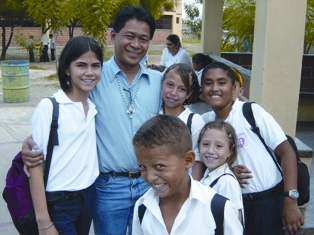
By Father Hermes ‘Larry’ Sabud SM
Father Larry Sabud was the first Filipino Marist to be ordained and also the first Filipino Marist novice master.
These were the questions raised by my parents when I told them that I was going to Peru andVenezuela to serve as a Filipino Marist missionary. My father continued to ask me, ‘Why do you have to go there? We have enough missionary work in the Philippines. And besides, there aren’t enough Marist priests in the Marist District in the Philippines. Why go, Larry?’
How would you have answered those simple and profound questions of Pastor and Raquel, my parents? I told them that what pushed me to decide to go on mission was my experience of grace. I joined the Society of Mary in 1985, made my first profession as a Marist in 1989, and was ordained priest in 1993. Despite many struggles and difficulties on my journey, I can say that I’ve received so many blessings from the Lord.
Moreover, as a Marist District, we too have been receiving so much from the generosity of the other provinces of the Society of Mary, confreres and many lay collaborators. Even though there were only five Filipino Marists priests – now there are six - when I left for Venezuela, even though the district is still fragile, I thought it was about time to express gratitude by offering a Filipino Marist priest to other Marist communities outside the Philippines which have greater needs. My parents were satisfied with my answers.
But I experienced the pain of letting go, albeit temporarily, of the Philippine Marist District, so dear to me, as well as of my family, friends, and familiar ways of doing things.
I arrived in Peru on 18 June 2003, not knowing what lay ahead, but with a great hope that the grace and blessings that had led me there would continue to inspire and energize me, especially when the journey would seem to appear tough.
Learning a new language certainly demands a lot of patience and humility. Until now I’m still struggling with it. After three months of studying Spanish in Lima, Peru, I worked for about a month in the Marist parish of Sullana in northern Peru, mainly to practice what I had learnt. Despite my limitations in their language, the people accepted me wholeheartedly, and I was able to establish a very good relationship with both young and old. As a missionary, I’m prepared to work anywhere, wherever my presence and resources are needed. My district superior in the Peru-Venezuela District appointed me to work in Venezuela. Presently, I am working in a parish of about 80,000 people in the Archdiocese of Valencia. The majority of the parishioners are poor and not many are active in the Church. We are four in the Marist community, a Venezuelan, ordained priest last March, two Spanish priests and myself. We also have a seminary, about fifteen minutes walk from the parish. We have four postulants and one preparing for his novitiate. Father Miguel Palumbo SM is the formator.
Apart from the celebrations of the sacraments, I have invested my energy in trying to organize small Christian communities among the different sectors of our parish. Venezuela has many young people, in our parish probably more than half of the population. Sadly, most of them are not interested in participating in activities in the church. I’ve tried to make some contacts and invent all sorts of activities to organize them, but it’s not always easy because of language limitations. The young people haven’t got enough patience with my Spanish. However, despite my limitations in the different aspects of my life as a missionary in Venezuela, I’ve been trying to share my experience of grace as a Filipino Marist priest. It’s a privilege to be part of the Marist project, the work of Mary, the work of God.
Letter To Camille
By Sister Leticia Bartolome ICM
This is Sister Letty’s reply to a letter from a student who reads Misyon.
Sister Leticia Bartolome
Dear Camille Margaret,
Peace and joy to you!
Thank you for your letter of 11 October 2004 which came in time for the celebration of World Mission Sunday. I hope that you prayed for all missionaries that day, not only for priests, brothers and religious sisters but also for lay missionaries.
Before I try to answer some of your questions perhaps I have to say to you that the word ‘missionaries’ refers not only to those who go to foreign countries and live and work with people of other cultures, races and beliefs. The ‘modern missionaries’ you refer to are Christ’s messengers of His Good News, wherever they may be. This can be done by words and by deeds whether one is in the Philippines or in other countries. Depending on the situations where we are, we try to do what we can to be witnesses of God’s love for everyone, to show that all peoples belong to the one family of God.
In these times of violence, fighting, wars, materialism and competition we see that we are living in a wounded world. What does a follower of Christ have to do? Each can answer according to their conscience and then move on to witness to and share the values of peace, understanding, service and hope, especially with the most needy.
You ask how I started to be a missionary Sister. I can answer that very simply: I heard Christ’s call to ‘come and follow me’ and with God’s grace I am where I am now. All of us who are on this same road in following Christ are sustained and strengthened by believing in His promise, ‘I will be with you till the end of time.’ Sometimes we encounter difficulties. In some places more serious problems arise but missionaries keep on because Christ also said, ‘Fear not, I am with you.’ So missionaries are called to be messengers of hope, peace and love.
Some missionaries directly proclaim the Good News and some just ‘preach’ without preaching but by word and example, depending on the country’s political and religious environment. Missionaries do not force their message on people but live with them with full respect for them and their culture. Missionaries take the ‘background’ while they encourage and teach people to help themselves. When the time is ripe and the harvest is assured - Christ is the Divine Harvester - it is also the time for the foreign missionary to be uprooted and be ready to go to another mission area and start all over again. In short, missionaries do not work to build monuments to themselves.
Regarding my own life here in Hong Kong, I am involved in ministries that do not require direct evangelization. I am involved with persons who have mental and learning disabilities, also in ministry for migrant workers, for child immigrants from Mainland China, and in a regular school setting. I am aware of the heavy demands and mission needs in a place such as Hong Kong where wealth, injustice and extreme poverty exist side by side. Yes, there are many poor and deprived people here. But Christ does not occupy a big place in the people’s lives. Many do not know him. ‘Don’t talk Jesus’ (a literal translation from the Cantonese language) has become a colloquial way of saying ‘I’m not interested in what you’re saying.’ It’s also used to abruptly end any unwanted remarks or topic.
In such a setting, how do I help ‘make disciples of all nations’ … ‘to proclaim the Message … whether the time is favorable or unfavorable?’ There is the constant challenge to devise different ways of spreading the Gospel, whether it be with a smile, friendship, a simple service, or just by witnessing through our own life. The life of a missionary here has to be prophetic and counter-cultural. If the culture is money, competition and drive for more wealth even at the expense of other people’s well-being, then the missionary’s life should go against these forces.
After 31 years of life here in Hong Kong (you can guess that I am no longer young) I can say gratefully that I have many Chinese friends now. They have opened their homes and their hearts to me. Most of my co-workers are not believers and don’t have any religion at all. Those who have are mostly Buddhists, with a few Christians. We respect one another’s beliefs and are united in friendship and love. Is this not coming from Christ?
I don’t know if this letter satisfies you, Camille. I hope I’ve answered your questions. Thanks again for writing. Thanks also to your teacher in CLE for encouraging you to reach out to missionaries and be our friends, even from many miles across the sea. Greetings also to your classmates and God bless you and your family.
Sincerely,
Sr Leticia Bartolome ICM
You may also contact Sister Letty at icmsisters@yahoo.com
Misyon, You’re A Gift
By Margie C. Abulon
Margie is one of our Misyon promoters in Zamboanga Sibugay. She teaches at Kabasalan National Vocational School.
M – agazine creating awareness among its readers of God’s call to all
I – nformative, interesting and enlightening articles touch hearts to share, to love
S – ervice-oriented, giving honor and glory to God in varied lands throughout the world
Y – oung and old alike find joy reflecting life’s realities and courageously meeting these challenges
O – bediently committed to the promotion of Christian virtues so needed in our times
N – otable in publishing inspiring messages of truth proclaiming God’s love, manifested in countless ways.
Congratulations and keep up the good work!
Our Hideaway
By Regina Fabularum
Regina Fabularum is a student at St Scholastica's College, Manila.
Searching for a Best Friend

Since I started studying at SSC, I’ve been searching for a ‘best friend,’ meaning … a person who would always be there for me especially when I’d have problems, who would accept me for who I am, who would listen to my stories truthfully, who would make me happy if I was in a bad mood, who would guide and protect me from danger, who would understand my feelings and who would love me. I might have had friends, but not the kind of friend I was looking for.
My Acquaintances
When I was in first year, we were four in our barkada, if I could call it such. Maybe they were just acquaintances during break times. I wasn’t able to picture real friendship with them. When I was in second year, I found another set of friends. We were three in the barkada, which I called at the time. But now I don’t know. We were happy with each other because we were only three. Perhaps, the fewer, the closer and so the better. We were called the ‘Powerpuff Girls’ because we were inseparable. My closest friend was ‘Blossom,’ for she wanted pink. My coolest friend was ‘Bubbles,’ for she wanted blue, and I was ‘Buttercup,’ for I wanted green. This was the greatest barkada I found so far in my present school. I thought they would be my best friends, but that didn’t last. The ‘Powerpuff Girls,’ who were known as inseparable before, parted ways last year. ‘Bubbles’ joined the barkada of her best friend, and ‘Blossom’ found a new best friend. I was left with no one. Sometimes I felt discriminated against, unloved and left out. That’s why I kept on praying to God our Father to send me a best friend.
Realizations
All I prayed for was granted except for the best friend I’d been longing for. I got high grades in academics. I won a quiz bee. My family was at peace. But still I couldn’t find the best friend I’d longed for. I thought of all that had happened in my life. I realized that my life had been wonderful. Despite the many pains I’d encountered, I found hope. I recalled being confined in hospital in a critical condition. We all prayed together for my recovery, and our prayers were heard. After five days I was cured. I was very thankful to God the Father and to Jesus our Savior. I also remembered when I almost died because of a toothache. I prayed to the Santo Niño to help me recover. After I prayed, the pain had gone.
With my memories, I wondered who was behind these acts of kindness, who was always there for me, who was solving my problems, who was protecting me, who was listening to my emotions, and who was loving me. Then I realized that it’s no other than Jesus who had been my best friend since I was a child. It was just that I hadn’t noticed it.
My Best Friend
When I found my best friend Jesus, I started telling him my daily stories. I always trust him and lift up to him my worries. He always helps me and guides me wherever I am. He always makes me happy. I’m contented having him as a best friend. Jesus could be your best friend too if you really wish. Jesus is my best friend, and he is the best friend of all for he is a friend forever. Remember, ‘Jesus is the same yesterday, today and forever’ (Heb 13:8).
You may contact Regina at: reg_mf08@yahoo.com
Vilvoorde Filipino Festival ‘O4
A personal account and reflection
By Sister Mary Carmela OCD
Sister Mary Carmela last wrote here in May-June 2004. The website of her monastery iswww.dentroost.ie
‘Oh, how good and wonderful it is when brothers and sisters live as one…’ (Ps 132)
18 September 2004 was a date worth remembering with joy and gratitude for another marvel done by God in our midst. The Filipino Fiesta celebration drew around 500 people from all walks of life. It was held at the Zaal Star, ‘Star Lounge,’ a parish-owned multi-purpose hall in the heart of Vilvoorde, a few blocks from the Carmelite monastery. Though initiated by the Filipino community here, under the able leadership of Lilibeth Villareal from Davao, it was strongly supported by Filipinos from other parts ofBelgium, with their families and friends.
The ‘dinner and dance for a cause,’ for the benefit of the Carmelite monastery church, was a great success. Because it was perfectly done and pleased everyone and because of the number who came? No! Success is not measured by quantity but by quality, not by how perfectly something is done but by the love with which it is done. To please everyone? We know that’s impossible! But the success of our fiesta lies in something more than that. We can only point to the unity, team-work, coordination, reconciliation, joyful and selfless giving of time, talents and resources by the different communities, Filipino and Belgian, without asking who would get the credit. This created the proper ambience and warm fellowship that led to a very enthusiastic response from the contented guests, something captured beautifully on their videos and by their cameras. There were many other hidden things seen only by the Lord that will surely be revealed on judgment day.
Each guest on arrival received lumpia rolls and a drink. The formal dinner began at 7:30 with an opening prayer by our parish priest, Pastor Geert Aelbrecht. The dinner for 500 reminded us of the multiplication of loaves when Our Lord fed 5,000. It was unbelievable how, with a modest sum of money for food, there was more than enough - except for rice and dessert! Fortunately, one Filipina had an extra sack of rice. But all were content with the delicious Asian dishes. The minor hitches were nothing compared to the generous, free labor of the kitchen staff, which normally costs much in Europe.. The preparation took several days before the feast itself.
The formal program started after 9. ilibeth Villareal was the main emcee, while Iny Goyvaerts-Driessen introduced the dances in Nederlands, Dutch (Flemish), one of Belgium’s two major languages, the other being French. There were nine dances. These included the Dugso, a ritual fire dance from Malaybalay, Bukidnon, done by two young Belgian-Filipina mestizas. Then two Ifugao boys, in the country for only two years, presented an Ifugao hunters’ dance, dressed in Ifugao costume. Seven dalagitas, wearingmalongs made from curtains, like the children’s dresses in The Sound of Music, did two dances of Filipino Muslims.Next were some dances by the Belga Cultura Filipina, all professionals.
Then came the finale. After Iny’s short introduction, a beautiful Belgian teenager in Maria Clara attire took over the microphone as narrator for a re-enactment of the Christianization of the Philippines. The participants were all misdienaars, Mass servers, of Carmel or Troostkerk, six of them children of Jan and Iny Goyvaerts, a Belgian couple. Their eldest son played Ferdinand Magellan, their second Rajah Humabon, their third the Spanish Augustinian missionary, their fourth child Queen Juana, their two youngest and another Mass server the children of the royal family.
This number culminated in the Sinulog, ending with Queen Juana raising the image of the Santo Niño. There were also two hand-painted images of the Sto Niño’s face,courtesy of the Sandiego Dance Troupe in Cebu,, raised by Magellan and the Augustinian friar.
The whole program was moving and awe-inspiring, and culturally enriching and informative, as there was an explanation before each dance. And there were many children and young people present, the dancers alone numbering around 20. The Sisters were happy and felt privileged to get to know some of them because they came to Carmel to practice and to pray the rosary with us on two Saturdays. The Sisters also watched the general rehearsal. May God and His Blessed Mother draw all these young people to Him. Who would ever think that Filipino dances could be a bridge to young people in modernEurope?
The affair ended with a dance for all. The organizing group, despite their tiredness, still had the generosity and thoughtfulness to come back the following day to clean up the place.
During the next few days everyone we met had nothing but praise for the Filipinos and their supportive Belgian spouses, children and friends. A few kind people gave constructive feedback to make the fiesta better next time.
The Sisters couldn’t find words to express their gratitude for the generous voluntary assistance of the Filipino community for the ongoing restoration of the church of this precious Carmel, the oldest existing community of Carmelite nuns in the world. Their help wasn’t only for this monastery nor for the valuable heritage of Vilvoorde City, but, above all, for the universal Church, the Mystical Body of Christ, in Whom we are all one.
Of course, the Vilvoorde Filipino community deserves not just a ‘big hand’ but a ‘grand salute’! We also owe our thanks to our parish priest, Pastor Geert Aelbrecht and Meneer (Mrs) Lucien Rummens, thezaal administrator, for allowing us the free use of the spacious hall and for being present at the affair.
We can only attribute everything to a power beyond us, Who made such a remarkable thing to happen in the midst of the spiritual crisis in Europe. As to its lasting fruits in the lives of people, we leave it all to God. We can only give Him all praise, glory and honor with Our Blessed Mother, Onze Lieve Vrouw van Troost,, Our Lady of Consolation, the Queen and Beauty of Carmel.
You may contact Sr Mary Carmela at zusters.karmelietessen@belgacom.net or at Karmelklooster, Trootstraat 2, 1800 VILVOORDE, BELGIUM.
Your Turn

By Freya Carmona
Dear Sister Grace,
As I was reading your story Strange Encounter ((March-April) I was inspired by the goodness of the Lord in the way he worked a miracle for you. I can relate to your story.
One time I went to Bacolod, three hours from home, just to refresh myself after busy school days. I stayed at my aunt's house. After a couple of days I needed to go home for school the following day. When I went to the bus terminal I opened my wallet to find that I had only P70. I suddenlyremembered that my aunt forgot to remind me about the money my mom had left with her for me. I wanted to go back to her house but realized that if I did, I’d miss the last trip to San Carlos City and wouldn’t be able to go to school the following day. So I decided to wait until the bus left.
That was the worst day in my life. I had to stand because there were no seats left. I was very thirsty but had no extra money left. Because of this I wanted to get off. Then I reflected that it would besayang if I did. So I decided to stay, even if it would be three hours before I could drink some water. The bus left at exactly 7pm and I was about to cry with the thirst. But I kept on praying. I was about to quit when a gentleman offered me his seat. But this didn’t alleviate my thirst. I wanted to shout and ask for water from the passengers but couldn't. I kept praying fervently. Even though I was about to ffaint I still managed to keep calm.
Thank God, I was sitting beside two ladies who asked my name and befriended me. They offered me some chips but I refused because they would make me thirstier. One had two bottles of water and offered one to her friend who declined it. She gave it to me instead. So I grabbed it. The wwater quenched my thirst.
I had so much to thank them for......They were my heroes for those hours. For me it was already a miracle.....God is so good. He won't let you down. It proves that in times of need God is always with you. But sometimes you can't feel his presence because you’re just being deaf to things in this world . . . Even a small thing like being able to eat three times a day is already a miracle. Now I can already value these ‘small things’ and this has made my faith in HIM stronger.
Thank you!
Freya Carmona
‘Africa’ In Cubao
By Sr Emma de Guzman ICM
After 30 years in Cameroon, Sister Emma is now working at home in the Philippines.
To the beat of drums, shouts of joy, clapping of hands and swaying dances, we celebrated an African Mass on Sunday, 27 February. Everything was African except the place - Holy Spirit School, Ilang-Ilang Road, Cubao,Quezon City.
‘We love you, Africa’ was printed in bold letters in the auditorium where the event took place. Below was written‘Welcome to all Africans and friends of Africa. Tayo ay magdiwang at magsaya.’ The pagdiriwang and pagsasayabegan with registration as participants started arriving at 9:30am.
Mini-United Nations
Old acquaintances embraced and greeted each other in English, French, Twi, Kikongo, Lingala, Swahili, Pidgin and other African languages. I was literally transported to Africa. Many ladies wore their beautiful and colorful traditional attire. More than African, the participants were international. It was like a mini-United Nations encounter. African countries represented were: Angola, Burkina Faso, Burundi, Cameroon, Congo (Congo-Brazzaville), Congo Democratic Republic (Congo-Kinshasa), Eritrea, Ethiopia, Ghana, Ivory Coast, Kenya, Madagascar, Nigeria, Rwanda, Senegal, South Africa, Uganda, Tanzania, Zambia and Zimbabwe. There were also friends from Brazil, Haiti, Irela nd,Mexico, and many Filipinos.
Religious from all around
Religious present included Xaverians, Holy Spirit Sisters, ICM Sisters, Mercy Sisters, Daughters of Charity, SVD’s, Mercedarians, Conceptionists, Claretians, Scalabrinians, CICMs, among others. I was overwhelmed at the number of CICM confreres and Cameroonian theology students at MST (Maryhill School of Theology) whom I had known in Cameroon.
The well-prepared Mass booklet had a map of Africa on the cover and the words ‘African Gathering.’ The songs were in French, Lingala, Tagalog, English and Swahili. The Eucharistic celebration began with a ritual, a short drama of a typical welcome in the African way: ‘Feel at home, welcome!!!’ Then a group danced the processional. Fr. Francis N’sapo Kande CICM, from Congo-Kinshasa, was the main celebrant. Concelebrants were Filipino missionaries who have worked in Africa: Fr Efren de Guzman SVD, Angola, Fr Carlos Lariosa SVD and Fr Dionisio Nellas SVD, Ghana and Fr Peter Casiño OSA, Tanzania.
Before the Gospel reading, the Bible was brought in, beautifully adorned on a palanquin and carried on the shoulders by two participants. They danced to the beat of the drums and the singing of the assembly. This was no ordinary Sunday Mass. Everyone was clapping their hands. No one can resist swaying to African rhythms. We sat down during the reading of the Gospel, the custom in Ivory Coastand some other African countries. The homily of Fr Dionisio Nellas centered on the theme of the African synod: Church, Family of God. He underlined African values. This was also the objective of the gathering: to strengthen fraternity, unity, moral support and encouragement of one another.
Highlights of the Mass included the processional dance at the offertory, and the giving of the sign of peace: warm hugs, embraces and handshakes. We had to forego the less exuberant Filipino smile.
African-Filipino Dishes
After Mass, we sat in a circle for the blessing of the agape. To everyone’s delight, the food was typical African and Filipino dishes. A program and dancing followed until past 5 pm.
The program included sharing experiences in small groups. Additional highlights were dramas of a marriage in Kenya, and a naming ceremony in Ghana, by Ghanaians, Cameroonians, Kenyans, Ivorians and Tanzanians.
The exchange of addresses and warm goodbyes after an afternoon of dancing were not easy. One felt that the celebration should go on. In my enthusiasm, I asked when the next African Encounter would be. Sr Mercy Benson SSpS, a Ghanaian member of the coordinating committee, answered me in Tagalog: ‘Isang beses lang po sa isang taon,’ ‘Once a year.’ I couldn’t help asking ‘Why?’ ‘It’s not easy to gather them all coming from the different islands of the Philippines.’
‘We love Africa’ is indeed a fitting theme. This was the logo printed on the T-shirts and badges given to those present. On the back of the T-shirts was printed: ‘Our Motherland forever.’
A Cameroonian acquaintance, Anicet, offered me his badge. I asked why he was giving his souvenir of the day to me. He answered: ‘I know you’ve left your heart in Cameroon.’ I thanked him with a hug exclaiming, ‘WE LOVE AFRICA.’
Whoever said the world has forgotten place Africa wasn’t with us in ‘Africa,’ Cubao!
You may contact Sister Emma at emma41545@yahoo.fr
‘Magellan’ Was A Belgian
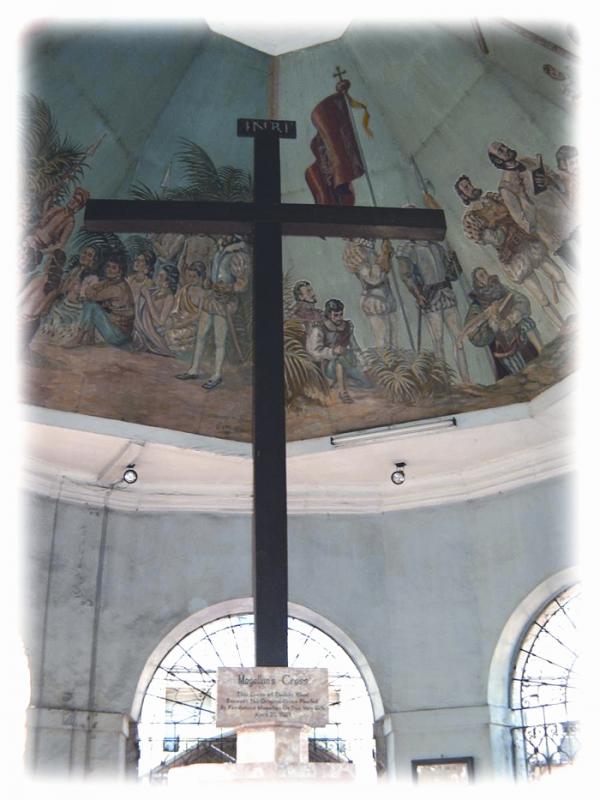
By Samuel Goyvaerts
Samuel Goyvaerts, a Belgian, is a university student. His father, Jan, also has an article in this issue.
‘Hello! My name is Ferdinand Magellan. I’m the one who tried to sail around the world, the first westerner to set foot in thePhilippines.’ Or at least I played him in the Filipino festival in Vilvoorde, Belgium, in September last year. My real name is Samuel Goyvaerts. I’m 18 and live with my parents and five brothers and sisters near the Carmelite monastery in Vilvoorde.
My siblings and I had to play and dance the Sinulog. Sister Carmela OCD told us the history and taught us the dance. Correction: taught my brothers and sisters. I, as a ‘western intruder’ didn’t have to dance. The eldest of the family, I had to play the role of the conqueror of the Philippines. I had to enter the scene with binoculars, a sword and a possessive look in my eyes. For me that didn’t involve much adaptation. I just had to play an all-knowing westerner bringing ‘civilisation’ to a supposedly uncivilised country. At least that’s what was always taught to us. But watching the play and learning from the Sisters about the Philippines, I realised that we should learn from the Filipino people, too.
In Belgium, festivals celebrating what we believe are rare. We have processions, but they’re always very serene and restrained. We sing but often our hymns, while sincere, are old. In our Sunday Mass the joy of the Lord is sometimes untraceable. There are different explanations for this. Firstly, we Belgians are, by our very nature, not that joyful. I think we do get a lot of joy in our faith but we don’t have the spirit to express this joyful feeling. We are far more reticent in expressing our feelings, very different from the Sinulog. Secondly, we don’t have a tradition of dancing and feasting in celebration of God’s greatness.
When I played in the Sinulog, when I saw and talked to the Sisters and other Filipinos, I realised it is something I think the Belgian Church misses. We do have youth Masses and songs that try to fill the ‘gap of joy.’ But the ordinary Eucharist doesn’t express the feeling of joy I observed in the Filipino festival and which I was happy to be part of.
Another great difference is the devotion. Every time before we practised the Sinulog we prayed to the Santo Niño. And theSinulog itself, dancing and celebrating with a statue of the Holy Child, is very uncommon to us. That is something we’ve lost here. There still is devotion, but it’s something for elder people. We lost a great deal of devotion because of secularisation. Practising Catholics like me are a minority in Belgium, and practising youngsters are an even a smaller minority. Being Catholic is mostly seen as old-fashioned. I think that is also a reason for our hesitation to express joy and devotion. Some feel even ashamed about still believing in God.
All this looks rather pessimistic. On the contrary, many of us young people are on the right track, trying to reintroduce belief in society and to think and act positively about the future. But there is still progress to be made and I hope we can keep learning from our Filipino brothers and sisters.


